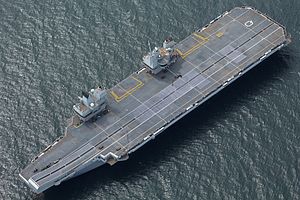The rumors that the planned visit of British Chancellor of the Exchequer Philip Hammond to China is being postponed due to Chinese displeasure at the deployment of a Royal Navy aircraft carrier in the South China Sea area on February 16 had an ominous feel to them. Britain is well used to being in the doghouse with Beijing. After all, former Prime Minister David Cameron had enraged Chinese leaders in the final years of the Hu presidency by meeting the Tibetan religious leader the Dalai Lama while he was in London to pick up a prize in 2012. But for the U.K. now, facing an imminent Brexit, the stakes have increased dramatically if they do get things wrong with China.
As the world’s second biggest economy, China would be a natural target for all the talk of a global Britain freed from the constraints of the European Union (EU) and able to head into the world and make trade deals with a new set of partners. At the moment, unlike the United States and Australia, China ranks not as Britain’s largest trading partner, but comes in an underwhelming fifth, ranked below Ireland. In terms of investment, too, it accounts for under 2 percent of the U.K.’s stocks. The vast bulk of investments are from the EU, or the U.S.
All this implies that there is plenty of room for growth in the China-U.K. relationship. If China had a similar legal, political and social system as the U.K.’s, then the optimism might have some basis. But the People’s Republic has none of those things. And as the deployment of the aircraft carrier in January showed, not a lot needs to happen before both parties are on a fairly stark collision course. For its principal security interests, Britain will always look west, to Washington, not east, to Beijing. And that is not going to change, Brexit or no Brexit.
Things are even more worrying now. As part of the EU, the U.K. at least had safety in numbers. On human rights and other contentious issues, it was able to speak as part of the world’s largest single market, and one that clearly matters to China. The EU accounts for over 450 billion euros ($510 billion) in two-way trade each year, and has been the main supplier of good quality intellectual property. This was why when President Xi Jinping spoke in Brussels in 2014, on the first trip by a Chinese head of state to the EU’s capital, he declared that both China and Europe were “civilizational partners.” It is also why, during the trade dust up with the United States since last June Li Keqiang and other figures have been keen to foster better links with the EU, in the (perhaps misplaced) hope that it can finally stand as an economic counterweight to the U.S.
Adrift of this block, the U.K. faces China on its own, with all the opportunities and the many risks, that involves. Most British seem to be surprised to learn that, while two decades ago the U.K. had a larger economy than China’s, now it is four times smaller. There has seldom been a case of such rapid reverse asymmetry. Britain once ruled the waves. Now, with the world’s largest navy in terms of vessel numbers (though still, in terms of technology, far behind the United States) China does – or at least the waves in the Asian region. And British gestures like sending a single aircraft carrier to the region risk being seen as just that – a provocative gesture.
It is good to show solidarity with allies like Australia, Japan, and the United States, for sure. And they, it seems, appreciate what Britain did. But the real issue is the mindset it betrays back at home base. Security experts in moments of candor in London will admit that a U.K. outside the EU is marginalized. For China, British Defense Secretary Gavin Williamson’s claim that the carrier deployment was an exercise to show the U.K.’s “lethality” must strike those even bothering to listen in Beijing as almost comically callow. Is China even interested in sea battles in any case when it is doing so well in the virtual space, where conflict in the future is most likely to be located? There are sound arguments that the whole massive construction of the Chinese navy is nothing more than a distraction. While everyone is looking anxiously at what Beijing is doing on the high seas, its in cyber space where it is really vying for dominance.
Like much of the rest of the world, the Chinese watched Brexit unfold with a conviction that there was some fiendish hidden plan concealed with in it. But along with many British citizens now, they are starting to see nothing more than the daily manifestation of incompetence. Emanating from this kind of strategic context, it would be a miracle if the Chinese believed that the U.K., were a real conflict to materialize, would have the commitment, or the conviction, to be able to stretch itself thousands of miles from home. After all, it is uncertain whether the U.K. can even properly function administratively in the eventuality of a no deal Brexit at the end of March.
There is old Chinese story of a canny king who declared from atop the walls of his empty castle to an invading army that there was no one inside. His words were regarded as a trick, causing the potential invaders to withdraw. This myth may have once applied to Chinese thinking about Brexit. But with acts like sending an aircraft carrier, without planes, into remote seas, the probability is that China will see not lethality, but empty posturing. And that seems precisely the conclusion Beijing quickly reached.
Kerry Brown is Professor of Chinese Studies and Director of the Lau China Institute. His “The Future of UK China Relations: The Search for a New Model” will come out with Agenda Publishing in May.

































